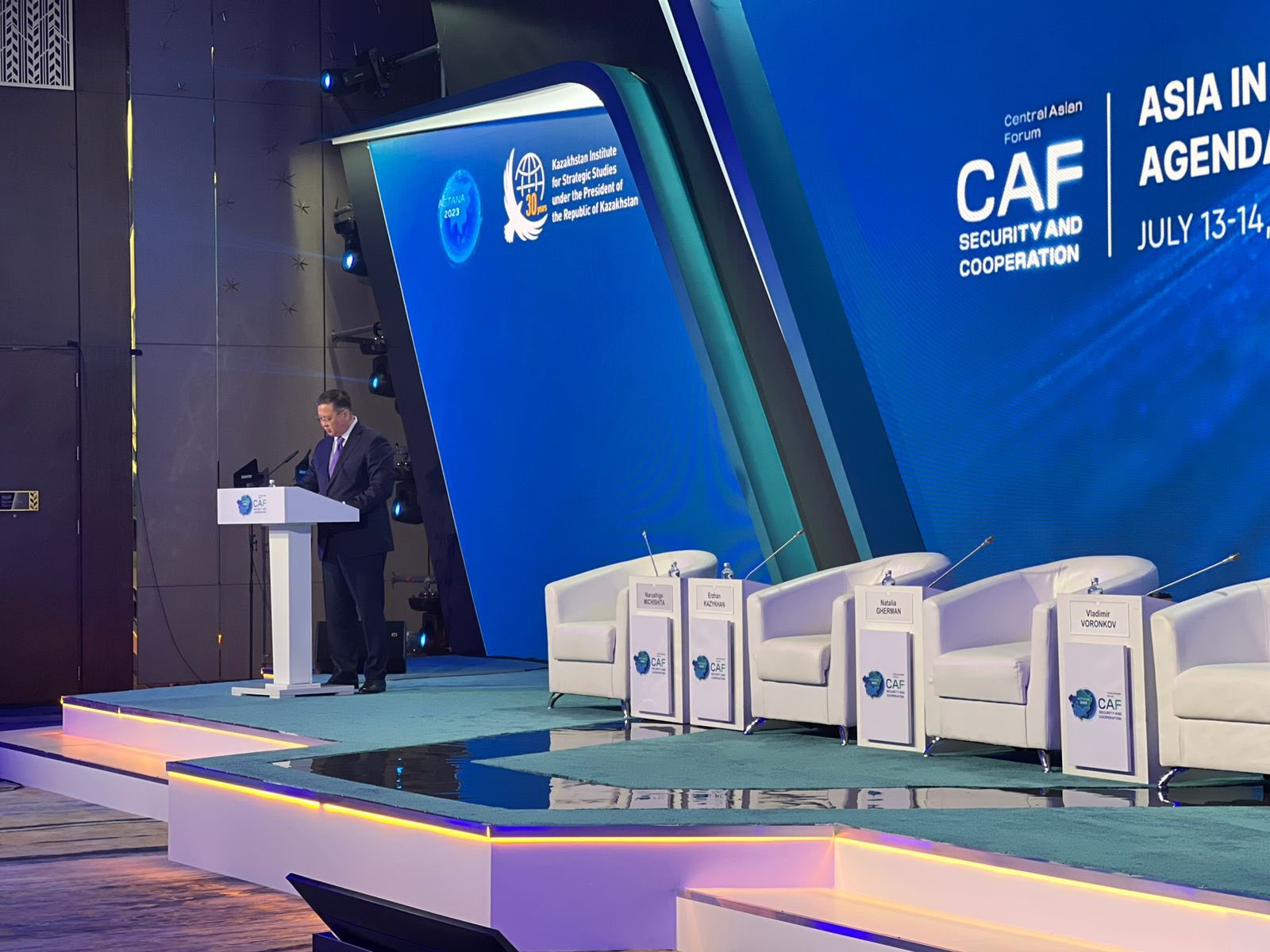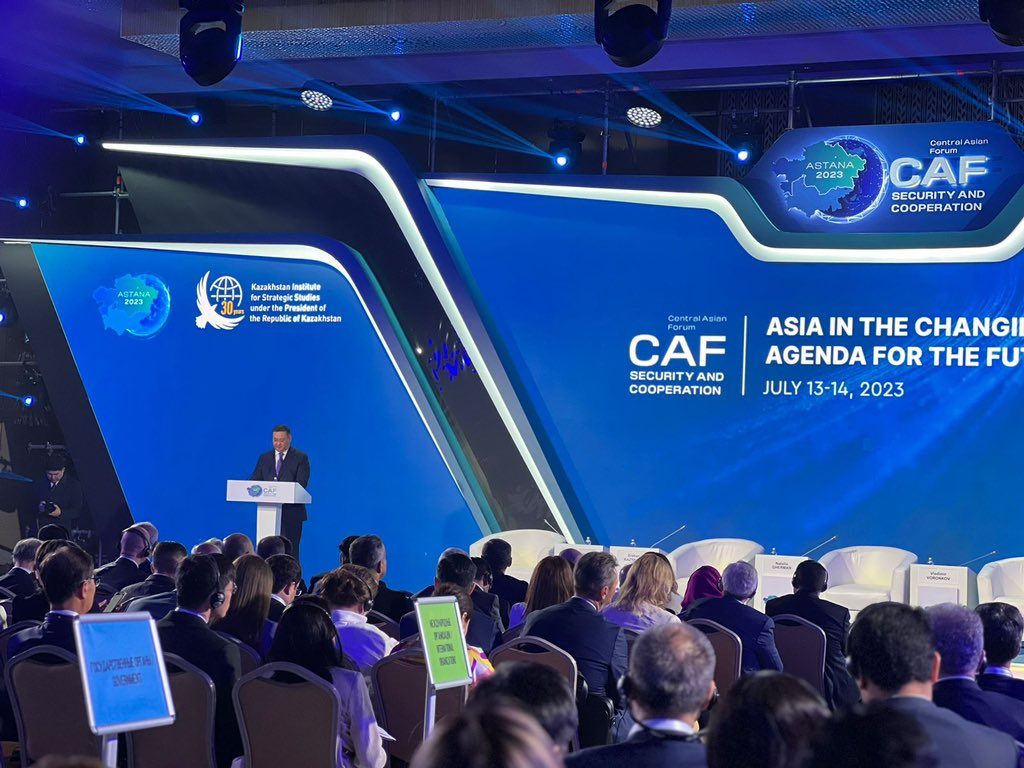ASTANA – Kazakhstan has consistently adhered to the principle a “successful Central Asia means a successful Kazakhstan,” said President Kassym-Jomart Tokayev in his remarks delivered by Deputy Prime Minister and Foreign Minister Murat Nurtleu on the first day of the Central Asian Security and Cooperation Forum (CAF) in Astana on July 13.

Murat Nurtleu reads out President Tokayev’s welcoming address at the Central Asian Security and Cooperation Forum. Photo credit: The Astana Times.
The President stressed that there is an urgent need for direct and open dialogue with the expert community in the current complex global environment undergoing a dangerous erosion of the foundations of the international relations system, rising geostrategic tensions, and global economic uncertainty.
Tokayev noted that of particular concern are trends such as a lack of trust, ideological polarization, and information wars. “Any systemic crisis, however, in addition to creating a wide range of threats, also brings new unique opportunities, including for Central Asia,” he said.
The President urged leading political scientists, economists, prestigious think tanks and research institutes to join efforts in seeking constructive ideas and effective approaches to building a more safe and just world, as specialists and experts can strengthen the region’s agency in the international arena and foster intraregional interaction and creative partnerships.

Murat Nurtleu delivers his remark at the Central Asian Security and Cooperation Forum. Photo credit: The Astana Times.
“We should, first of all, proceed from common intrinsic security interests and an unwavering aspiration towards comprehensive cooperation on the path toward sustainable progress,” he said.
According to the President, an optimal model of sustainable regional development should be based on three interrelated elements – an effective public administration system, a competitive market economy and a socially responsible inclusive society.
In his own remarks, Nurtleu said Kazakhstan is determined to continue pursuing a balanced, multi-vector, and constructive foreign policy amid unprecedented challenges posing serious threats to the existence of some nations.
He said while some parts of Asia experience rapid growth, others see instability through chronic conflicts, mutual distrust, and geopolitical rivalry.
Kazakhstan has regularly put forward many initiatives aimed at ensuring Asia’s peaceful and long-term development, he noted.
“Investments in economic welfare, mutual cultural enrichment and dedication will pave the way for our social and economic prosperity, security and stability on the entire continent,” he said.
According to the minister, with a mission to promote stronger regional interaction through various initiatives to unlock Central Asia’s potential, Kazakhstan hopes that the Treaty on Friendship, Good-Neighborhood and Cooperation for the Development of Central Asia in the 21st Century will enter into force to expand the long-term strategic partnership.
Nurtleu added that Kazakhstan pays attention to the Central Asia + format, which facilitates a number of dialogue platforms between the region and outside actors, including China, the European Union, India, Japan, Russia, South Korea and the United States.
The minister mentioned the Great Gain concept coined by Kazakhstan to amplify existing opportunities for cooperation.
Seeking to transform Central Asia into a Eurasian transport and logistics hub, Kazakhstan is keen to merge strong partnerships along the Middle Corridor to exploit the potential of China’s Belt and Road Initiative, the EU’s Global Gateway initiative, and the G7’s Partnership for Global Infrastructure and Investment.
Nurtleu outlined key security challenges, including water and environment, border disputes, and the situation in Afghanistan.
Regarding shortage of water resources, Kazakhstan proposed to establish a Regional Water and Energy Consortium, the minister said. While restoring the Aral Sea via the International Fund for Saving the Aral Sea, the country seeks mutually acceptable agreement on transboundary rivers with Afghanistan, China and Russia.
Peaceful negotiations are the only solution to the border disputes in Central Asia, Nurtleu stressed, noting that Kazakhstan has signed border agreements with all the neighboring countries and is ready to share its experience.
He recalled the Convention on the Legal Status of the Caspian Sea signed in Aktau in 2018 and the President’s remark at last year’s United Nations General Assembly, where he said, “we must ensure that the Caspian Sea becomes a sea of peace and new opportunities.”
Regarding the situation in Afghanistan, Nurtleu reiterated Kazakhstan’s proposal to establish a UN Regional Hub for Sustainable Development in Central Asia and Afghanistan in Almaty, as the achievement of peace in Afghanistan is a critical prerequisite for the future development of Asia and Europe.
He spoke about Kazakhstan’s initiatives to foster security, including the Conference on Interaction and Confidence Building Measures in Asia (CICA), nuclear non-proliferation, and through current chairmanship of the Shanghai Cooperation Organization.
“Kazakhstan and its CICA partners stubbornly promote the idea of establishing a pan-Eurasian security system,” he highlighted.
Concerning global nuclear non-proliferation and disarmament, Nurtleu pointed to the establishment of the Central Asian Nuclear-Weapon-Free Zone, stating his hope that such zones will be expanded to other regions, especially in Asia.
As Kazakhstan is pushing for the complete elimination of nuclear weapons by 2045, the minister said, it keeps advocating for the early entry into force of the Comprehensive Nuclear-Test-Ban Treaty, the universality of the Nuclear Non-Proliferation Treaty and the further expansion of the Treaty on the Prohibition of Nuclear Weapons.
He also mentioned Tokayev’s initiative to establish the International Agency for Biological Safety to use biological developments solely for peaceful purposes.
With Asia standing as a beacon of hope and opportunity in the interconnected world, Kazakhstan will continue to pursue a proactive approach to the region’s development amid emerging challenges and opportunities, Nurtleu concluded.

